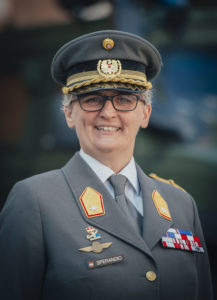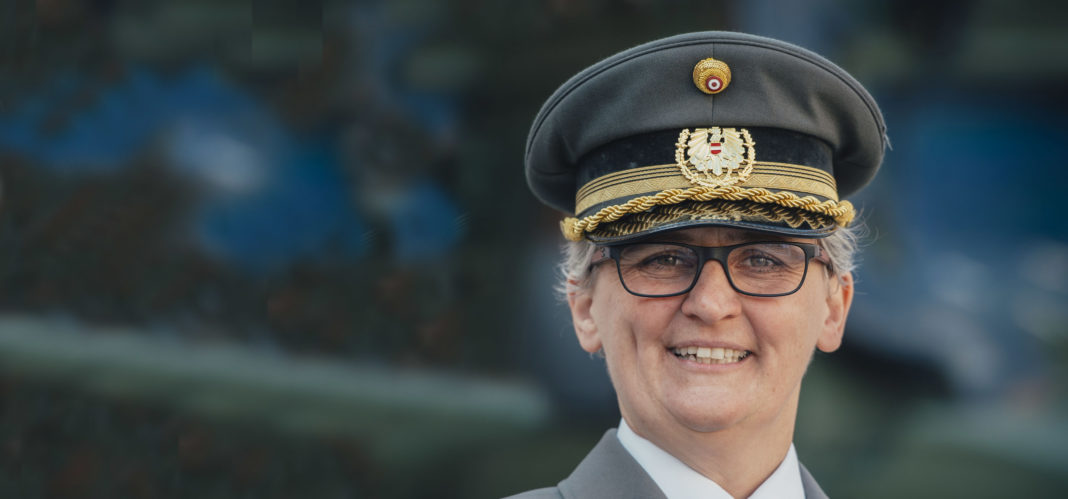Brigadier General Sylvia Sperandio heads the Armed Forces’ military health service and warned of the dangers of a pandemic before the turn of the year.
Brigadier Sperandio, in the analyses of the Austrian Armed Forces, a pandemic has been considered the greatest threat to the Austrian population for years, alongside terrorist attacks and a large-scale blackout. How surprised were you that the virus spread so quickly? As a doctor, something like this shouldn’t really surprise me. The threat posed by SARS-CoV-2 is primarily due to the fact that it is a pathogen that we do not yet know. We have neither a drug nor a vaccine against it. In the words of the military: we currently have no suitable weapons against this virus. 
.
In the “Annual Security Policy Forecast 2020” published in December, you warned of the effects of a pandemic and criticized Austria’s preparations for it as inadequate. In which areas were your fears confirmed? I made it very clear in my report that the pandemic plans that were developed in 2006 due to influenza, as well as many other existing alarm and crisis plans, were not sufficiently evaluated in advance. On the one hand, this leads to delays in setting up an adequate crisis team, and on the other hand, it means that the resources and capabilities of those involved, such as the Austrian Armed Forces, are not sufficiently known. On the other hand, the infrastructural changes of the past fifteen years should be taken into account. We no longer have many of the military hospitals that could support us with additional bed capacity in the event of a pandemic. If you don’t survey this and check that the existing plans are up to date, you don’t know what you can rely on. Because of my assignments abroad and the training I completed at the UN and in the EU, I know that you should be aware of all the structures that could support you in an emergency. Ideally, I even know who my direct contact person is.
“the pandemic plans that were drawn up in 2006 due to influenza were not sufficiently evaluated in advance. “
To what extent has combating a potential pandemic been on the Armed Forces’ agenda in recent years? We have repeatedly tried to push the issue forward and also pointed out that certain preparations would have to be made in the event of a pandemic. However, these have hardly been taken up. I would like to see much closer coordination with the civilian healthcare system. In addition, there are exercises and simulation games that can be used to check as realistically as possible whether the existing crisis plans are actually feasible and work. To put it provocatively: did it take a pandemic like this to raise awareness of the issue and to update and evaluate prevention and crisis plans? Because we are all affected by the crisis to a certain extent, awareness is very high at the moment. However, this will level off again because, fortunately, we haven’t had many deaths or infected people in Austria. It’s a bit like New Year’s resolutions. These also tend to fade quickly and people fall back into old patterns. That’s why it’s important to tap into existing awareness now and evaluate and revitalize all relevant crisis plans. What lessons can the armed forces learn from the situation? The armed forces must also focus more on prevention in the future. For example, when it comes to protective equipment or rapid access to medication. We have definitely become more aware of the need for optimization in this area. Furthermore, in coordination with the civilian healthcare system, we should also consider the extent to which a further developed military healthcare system can be used as a strategic reserve in the future. I am talking here about hospital beds, but also protected transport units for infected persons and mobile field hospitals. How busy have the past few weeks been for you? The last few weeks have definitely been very labor-intensive, and we were very focused on one topic. Because the armed forces are an organization that has been trained for deployment, this deployment-related work was very fulfilling for me – even if it was really exhausting. If I wasn’t that kind of person, I wouldn’t have joined the military in the first place. Nevertheless, I am now glad that my workload has recently decreased somewhat.
“Instead of drawing comparisons, I would like to see more thought given to how joint crisis management within the EU could be further improved.”
How do you rate the approach in Austria? Was the right thing done quickly enough? In my view, it is not yet possible to make an overall assessment. We are still in a crisis. Furthermore, it makes little sense to compare the approaches of different countries with one another, because an incredible number of parameters are decisive for crisis management. In addition to the state of the health and social system, geopolitical factors also play a key role, for example. I would therefore like to see more thought given to how we can further improve joint crisis management within the EU instead of drawing comparisons. Of course, national autonomy is needed for many things, but there are also issues that are easier to resolve within a community.










